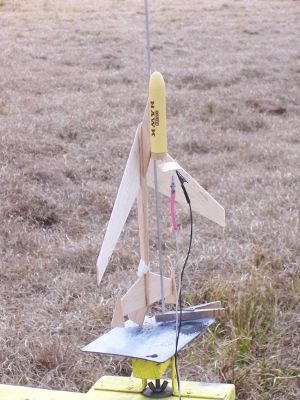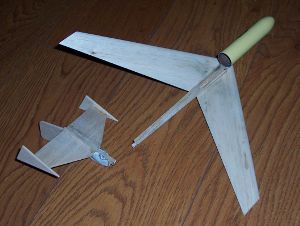| Construction Rating: | starstarstarstarstar |
| Flight Rating: | starstarstarstarstar_border |
| Overall Rating: | starstarstarstarstar |
| Diameter: | 0.74 inches |
| Length: | 12.40 inches |
| Manufacturer: | Semroc  |

Brief:
I put my order into Semroc during their end of the year Christmas discount. My order was already over $40.00 and the
Hawk was a free kit! I added an extra Hawk to my order. One to build, one to hoard.
I had an AMROCS catalog in the early 1970s. I remember thinking it was a near twin to the Estes Falcon. With laser cut fins, this kit went together much easier than my original Falcons did.
Construction:
There aren't many pieces in the kit inventory. 2 sheets of laser cut balsa make up the bulk of the model. That and a
BT-20 Body Tube, nose cone and 1/8" launch lug round out the kit.
- 1 Balsa Nose Cone, BNC-20H
- 1 Body Tube, BT-20J
- 1 Set Laser Cut Fins, FV-65
- 1 Launch Lug, LL-2A
- 1 Small Hawk decal
I read through the instructions and noticed something important. At Step 16 you are instructed to fillet all joints, then round all edges and airfoil the wing. I decided to round most everything and airfoil the wings before gluing things together, except for the pylon halves. I glued them together, then rounded the leading and trailing edges.
All pieces released well from the laser cut balsa sheets. This balsa is 3/32" thick. The old Estes Falcon was made from 1/16" balsa. If memory serves me right, Semroc decided to go with the Hawk design over the Falcon because the Hawk's balsa was a little thicker and structurally stronger.
I sanded off all the tabs and blackened edges with 320 grit sandpaper on a block.
It's amazing how strong the model is when glued together. Considering it's just balsa, the "T" shape of the fuselage makes for a very sound main body.
At Step 13, I sanded an slight angle in the wing root edge to give a better flush fit against the fuselage.
I decided to fill and paint the motor tube separately from the glider. I temporarily taped the engine mount to the pylon to glue the wings in place. The engine tube/nose cone assembly has to be in place for the gluing of the wing dihedral. While the model sits on it's back, You glue the wings roots to the fuselage under the "T" of the fuselage. The dihedral is formed by letting the wing tips hang and touch the work table.
While the instructions say not to glue in the nose cone until after balancing the model, I wanted to finish it with the body tube so there would be a smooth transition with no nose cone/body tube seam. If it needed nose weight, I would add clay too the bottom of the engine mount tube.
The small triangular stabilizer tips have a laser cut alignment line burnt into them. The laser line was slightly out of parallel with the top of the piece. I checked the photograph on the instruction cover shot and saw the line was correct. The line was cut a little longer than the stab edge which helped the alignment.
Finishing:
It's not recommended to fill and paint the Hawk. I decided for a compromise. I filled and painted the nose cone,
engine tube and launch lug. The underside of the glider got a coat of black felt pen. The dried felt tip ink shouldn't
add any real weight to the glider.
I glued the nose cone into the body tube and used thinned Elmer's Carpenter's Wood Filler to fill the nose cone joint and body seams. I also filled the seams on the launch lug. The assembly was glued onto the pylon.
I then glued the lug to the motor tube an filleted the lug.
I primed then spray painted the engine mount/nose cone assembly yellow. It looks alright, but I wish I'd gone with a slightly darker yellow. I wanted a good contrast with the black logo decal.
The small, black Hawk logo was applied to the motor mount assembly. I added a coat of white glue to the front of the fuselage to protect the "skiff" from a hard landing. I also coated the top of the fuselage "T" and rear of the pylon to protect the balsa from the engine exhaust.
Construction Rating: 5 out of 5
Flight:
After a few backyard throws I found the glider needed some clay near the rudder.
First flight was on February 7, 2009. I traded Brian Cole a 3-pack of C6-5s for some 1/2A6-2s.
The launch was straight up to maybe 100 feet. The engine ejected with a very loud "pop". I had a long, flat glide into the scrubs and trees. Andrew timed it until it went out of sight. The duration was 18.5 seconds.
I didn't add any trim weight not thinking the model would glide that far away. For the second flight I added a little clay to the right wing tip hoping it would cause it to fly in a wide circle.
 The second 1/2A6-2 boost was the same. But, at ejection, the Estes "shotgun" ejection charge
broke the fuselage in two above the stabilizer. The two body parts spiraled in slowly. Non-glide duration was 9.5
seconds.
The second 1/2A6-2 boost was the same. But, at ejection, the Estes "shotgun" ejection charge
broke the fuselage in two above the stabilizer. The two body parts spiraled in slowly. Non-glide duration was 9.5
seconds.
Recovery:
PROs: It boosted straight and the glide was great on the first flight.
CONs: Mine didn't survive the Estes "shotgun" ejection charge. This isn't the fault of Semroc. They brought back and delivered a great kit.
Flight Rating: 4 out of 5
Summary:
I read that Carl (Semroc) decided to bring back the AMROCS Hawk instead of the Estes Falcon. The body of the Hawk was
stronger than the Falcon. I hope to (one day) fix it and fly it again.
Overall Rating: 5 out of 5
Other Reviews
- Semroc Hawk By Tyler Jones (March 29, 2009)
Brief: The Hawk is a boost glider that uses a rocket engine to get itself in the air. It is a "Retro-Repro" of an older rocket. Semroc is selling them for $7.50 right now so I decided to pick one up. Construction: When I bought the kit I figured there wouldn't be very many pieces. I got it and found only 5 parts in the whole kit. It comes with: 1 BT-20J ...
- Semroc Hawk By Paul Morris (March 22, 2009)
Brief: A retro boost glider that was purchased for me by my nephew and niece for my birthday. This was the first model rocket that I have built since I had a stroke--and it proved a bit of a challenge. Construction: The kit comes in a bag and contains: motor mount 2 balsa sheets of parts balsa nose cone decal launch lug The balsa was light, ...
- Semroc Hawk By Matt Gillard (March 22, 2009)
Brief: A Retro-Repro production from 1965. The Hawk is a quick to build boost glider that ejects its motor and glides back down. Flies almost from the building board. Construction: Kit comes in a plastic bag and contains: 1 instruction booklet 2 3/32" balsa part sheets 1 BT-20 motor tube 1 Balsa nose cone 1 1/8" launch lug 1 Hawk decal ...
- Semroc Hawk By Robert Gustin (March 12, 2009)
Brief: The Semroc Hawk RetroRepro boost glider is a very simple to build and easy to fly rocket boosted glider. Based on the 1965 AMROCS Hawk, it ejects its motor to establish a stable, balanced glide. Construction: In the well packaged kit you get: 1 Instruction set 2 3/32" balsa part sheets 1 BT-20 motor tube 1 Balsa nose cone 1 1/8" launch lug ...
- Semroc Hawk By Jim Bassham (March 7, 2009)
Brief: This is Semroc's Retro-Repro kit of the 1965 AMROCS Hawk. It is a swept-wing boost-glider that uses motor ejection to change CG at apogee. Construction: The kit consists of a balsa nose cone, an 18mm motor tube, a launch lug, a waterslide decal, and two sheets of laser-cut balsa parts. The instructions in this Semroc kit were well written, logical, and generously ...
- Semroc Hawk By Howard Smart (January 31, 2009)
Brief: Near reproduction of a boost glider (BG) kit from 1965 made by AMROCS. This is a forward motor BG which changes from boost to glide by ejecting the motor casing, shifting its CG to the rear for gliding flight. Construction: This kit contains: (2) Balsa fin sheets - laser cut Nose cone - Balsa Motor mount 18mm Launch lug Decal Construction was ...
- Semroc Hawk By Chan Stevens (January 3, 2009)
Brief: The Hawk was originally introduced by Advanced Model Rocket Systems (AMROCS) in 1965. Its design is very much like the Estes Falcon. It's technically a boost glider, although it doesn't use a carrier vehicle, instead relying on ejecting the motor to handle the necessary shift in CG/CP relationship. This Semroc "retro repro" faithfully reproduces the original ...
 |
 |
Flights
Sponsored Ads
 |
 |











